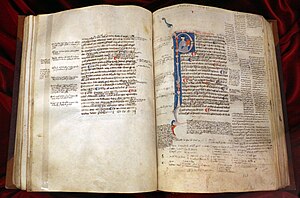
The Prior Analytics (‹See Tfd›Greek: Ἀναλυτικὰ Πρότερα; Latin: Analytica Priora) is a work by Aristotle on reasoning, known as syllogistic, composed around 350 BCE.[1] Being one of the six extant Aristotelian writings on logic and scientific method, it is part of what later Peripatetics called the Organon.
The term analytics comes from the Greek words analytos (ἀναλυτός, 'solvable') and analyo (ἀναλύω, 'to solve', literally 'to loose'). However, in Aristotle's corpus, there are distinguishable differences in the meaning of ἀναλύω and its cognates. There is also the possibility that Aristotle may have borrowed his use of the word "analysis" from his teacher Plato. On the other hand, the meaning that best fits the Analytics is one derived from the study of Geometry and this meaning is very close to what Aristotle calls episteme (επιστήμη), knowing the reasoned facts. Therefore, Analysis is the process of finding the reasoned facts.[2]
In the Analytics then, Prior Analytics is the first theoretical part dealing with the science of deduction and the Posterior Analytics is the second demonstratively practical part. Prior Analytics gives an account of deductions in general narrowed down to three basic syllogisms while Posterior Analytics deals with demonstration.[3]
- ^ Aristotle's Prior Analytics Classical archive, Massachusetts Institute of Technology
- ^ Patrick Hugh Byrne (1997). Analysis and Science in Aristotle. SUNY Press. p. 3. ISBN 0-7914-3321-8.
... while "decompose" - the most prevalent connotation of "analyze" in the modern period — is among Aristotle's meanings, it is neither the sole meaning nor the principal meaning nor the meaning which best characterizes the work, Analytics.
- ^ Smith, Robin (1989). Aristotle: Prior Analytics. Hackett Publishing Co. pp. XIII–XVI. ISBN 0-87220-064-7.
... This leads him to what I would regard as the most original and brilliant insight in the entire work.